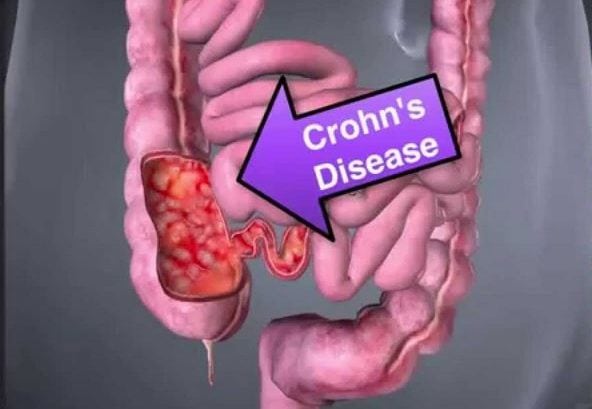Crohn’s
Crohn’s disease is an inflammatory bowel disease (IBD). It causes inflammation of the lining of your digestive tract, which can lead to abdominal pain, severe diarrhea, fatigue, weight loss and malnutrition. Inflammation caused by Crohn’s disease can involve different areas of the digestive tract in different people.
The inflammation caused by Crohn’s disease often spreads deep into the layers of affected bowel tissue. Crohn’s disease can be both painful and debilitating, and sometimes may lead to life-threatening complications.
CAUSES
The exact cause of Crohn’s disease remains unknown. Previously, diet and stress were suspected, but now doctors know that these factors may aggravate but don’t cause Crohn’s disease. A number of factors, such as heredity and a malfunctioning immune system, likely play a role in its development.
- Immune system.It’s possible that a virus or bacterium may trigger Crohn’s disease. When the immune system tries to fight off the invading microorganism, an abnormal immune response causes the immune system to attack the cells in the digestive tract, too.
- Crohn’s is more common in people who have family members with the disease, so genes may play a role in making people more susceptible. However, most people with Crohn’s disease don’t have a family history of the disease.
SYMPTOMS
When the disease is active, signs and symptoms may include:
- Diarrhea is a common problem for people with Crohn’s disease. Intensified intestinal cramping also can contribute to loose stools.
- Fever and fatigue.Many people with Crohn’s disease experience a low-grade fever, likely due to inflammation or infection. You may also feel tired or have low energy.
- Abdominal pain and cramping.Inflammation and ulceration can affect the normal movement of contents through your digestive tract and may lead to pain and cramping. You may experience anything from slight discomfort to severe pain, including nausea and vomiting.
- Blood in your stool.You might notice bright red blood in the toilet bowl or darker blood mixed with your stool. You can also have bleeding you don’t see (occult blood).
- Mouth sores.You may have ulcers in your mouth similar to canker sores.
- Reduced appetite and weight loss.Abdominal pain and cramping and the inflammatory reaction in the wall of your bowel can affect both your appetite and your ability to digest and absorb food.
- Perianal disease.You might have pain or drainage near or around the anus due to inflammation from a tunnel into the skin (fistula).
HOMOEOPATHIC TREATMENT
While treating Crohn’s Disease, the treatment needs to be targeted at the level of the immunity of the patient and the treatment must be able to restore the altered immunity back to normalcy.Homeopathic treatment precisely does this. Crohn’s Disease is a constitutional disorder; hence it calls for in-depth constitutional homeopathic medication. The homeopathic medicine for the patient is selected on the basis of the individual case study, incorporating the study of the disease symptoms as well as the emotional sphere of the patient. With the constitutional homeopathic approach, we have observed very good results in cases of Crohn’s disease. There is definite improvement in the symptoms of the disease as well as control of the further progress of the condition. Homeopathic treatment is strongly recommended for the treatment of Crohn’s disease.

